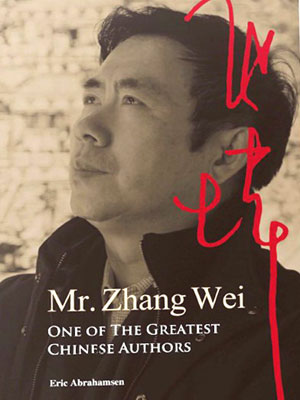"His (Zhang's) exquisite descriptive power and the fairy-tale quality of his writing has led to a reputation as one of the most powerfully creative writers in China," Abrahamsen comments.
Zhang, born in 1956, started his writing career with poetry in 1975, before attempting his first novel.
"I was an eager reader and had read almost all of the translated foreign works at the time," Zhang says. "But the writers who influenced me deeply are ancient literati Qu Yuan, Li Bai, Du Fu and Su Shi."
Having won 60 literary prizes and published 300 titles in multiple languages, Zhang established his name with the novel The Ancient Ship, published in 1986.
The novel caused a stir because Zhang captured and previewed moments of turmoil in Chinese social transformation, as well as so-called sensitive topics then. The book's translator, Howard Goldblatt, called him a mystery among Chinese writers.
The next bomb he threw to his readers was September's Fable, published in 1992. It's a novel about the natural order being distorted by modernization.
Wang Yiren, one of Zhang's faithful readers born in 1974 and editor of the Jilin-based newspaper New Culture View, says these two works by Zhang influenced Wang and even reshaped his values and personal character to be an individual thinker and to contain loneliness and others' judgments.
In 1988, Zhang began writing his magnum opus, You're On the Highland, about the vicissitudes experienced by four generations of two families over 100 years of social changes. Even his minor characters that are bad guys are vivid and have merits readers would love.
The result is a 10-volume novel with 4.5 million words, which also won him the prestigious Mao Dun Literature Prize in 2011.
"It's not a literary trial or a smart design that I wrote so long a novel. But it's a free expression, that I've longed for, of the ideas I got during my numerous visits to the countryside," Zhang says.
Zhang is not one of those writers who stay secluded in their study. Over the years, he has traveled many miles to experience reality in vast rural areas and talk with as many people as possible to gather literary sources.
"It's a habit I've been keeping for decades. Once I even stayed and lived at a burial ground for a month," he says.
"However developed and urbanized China becomes, rural China will be the most widely read subject because we have such a big population in the countryside," he says.
The first five volumes of the magnum opus are being translated into English, but that painstaking work will take a little time.
"Readers outside of China rarely get to appreciate the poetry and beauty of our composition. In the same way that a weak nation has no real diplomacy, a weak country gets no real appreciation of its works.
"So far as I know, many are reading to peep into an alien country to fill up their curiosity, not for literature. So a country has to be strong, and we should work for equal treatments in appreciating our literature," he says.
 |
| Two new books, published in English by Royal Collins Publishing Group, may help more readers get to know author Zhang Wei. |
Chen Xiaoming, literary critic with Peking University, says Zhang is a highly creative and romantic writer.
